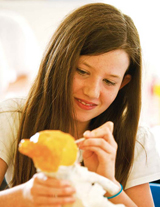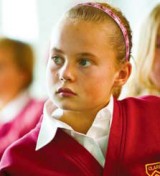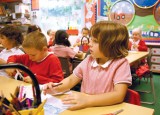Despite the initial fears of some parents, the creative curriculum at Helen Hoarle's school has not come at the expense of 'academic'...
“I’ve heard that you are very creative here. That’s fine, but my child needs an academic curriculum. He is very bright.”
These were the words of a prospective parent I was showing around our school, Grimley and Holt CE Primary in Worcestershire. They highlight a common misconception amongst many that creative learning is a bolt on, perhaps carried out on Friday afternoons when all the serious academic work is done. Fortunately Ofsted (we have been rated ‘Outstanding’) and the many visitors that come to our study days disagree, recognising that using a creative enterprise approach to learning engages children, empowering them to achieve higher academic results in all subject areas. They understand that children love to play, to create other worlds and to use their imaginations in maths and science, as well as the arts. So why stop after the foundation stage when we can harness this natural ability to put children in the driving seat of their learning?
Our curriculum is built around Mantle of the Expert: a drama enterprise approach invented by Professor Dorothy Heathcote to give children greater responsibility in their learning. The key elements in Mantle of the Expert are that:
• The children are given expert roles
• They set up a fictional enterprise
• They are set tasks set by the client(s) which engage many aspects of the curriculum such as mathematics, English and PSHE.
• A collective imagination, inquiry, problem solving and power develops
 We have been using ‘Mantle’, as the children call it, for four years; with every class running a new drama enterprise each term. They might be running an animal sanctuary, a museum, a factory, a hotel or a shop. They might be documentary makers, party planners, safari park keepers, publishers, underwater archaeologists, travel agents or scientists. The children learn about real life companies, they have deadlines to meet and clients to please. However, the enterprise is not ‘real’ in the sense that there is no profit involved, and the companies can be based upon pure fantasy. Recently, our Y5/6 class became dragon trainers in a world of Vikings, which was, of course, based upon the world created by Cressida Cowell in her famous series of children’s books. If you like the sound of this approach, why not try one of these examples that have been successful across our school?
We have been using ‘Mantle’, as the children call it, for four years; with every class running a new drama enterprise each term. They might be running an animal sanctuary, a museum, a factory, a hotel or a shop. They might be documentary makers, party planners, safari park keepers, publishers, underwater archaeologists, travel agents or scientists. The children learn about real life companies, they have deadlines to meet and clients to please. However, the enterprise is not ‘real’ in the sense that there is no profit involved, and the companies can be based upon pure fantasy. Recently, our Y5/6 class became dragon trainers in a world of Vikings, which was, of course, based upon the world created by Cressida Cowell in her famous series of children’s books. If you like the sound of this approach, why not try one of these examples that have been successful across our school?
• Party planners who have to plan an authentic Roman party for Victoria and David Beckham
• A board game company commissioned to create a game of Monopoly with a World War 2 context
• Healthy hoteliers who were asked to design a hotel for Jamie Oliver to put his name to
• Underwater archaeologists who are asked to find lost artefacts from the wreck of the Titanic.
Imagine being part of a KS1 class when Mummy Pig (the client) enters the room looking very upset! She needs some help because the three little pigs have left home, but they haven’t got a clue about building houses. What’s worse, there’s a wolf on the loose! Mummy Pig needs some help from the experts at the Story Town Council.
Stepping out of role, the teacher can then ask the children “Shall we agree to help her as town councillors?” (The children will be very willing to help.)
After spending some time ‘building belief’ through a variety of tasks such as creating badges and writing about their character, the children decide to meet with Mummy Pig and listen to her concerns. They agree that they must design and build houses for the three pigs that will protect them from the wolf, and that to do this they must find out about wolves. Mummy Pig then sets the criteria for the maths and technology work that follows. For example, she wants all drawings labelled with measurements, as the children have been learning how to use a ruler accurately in maths.
The town councillors then receive a call from the Wolf Protection League who ask them to ensure that the Wolf will not be hurt. This naturally leads the children to more inquiry using a range of sources, and the children also go home talking about the dilemma.
Even young children are able to present their ideas, debate and discuss. They know they are all a valued part of their ethical company and it is serious work trying to meet their clients’ needs. This style of learning is child-led and it also challenges the children to use higher level communication and thinking skills.
 The client is crucial to ensure challenge is high and children are given clear feedback. The teacher can use the client to ensure that learning outcomes are clear and challenging and we find that constructive feedback from the client is often more readily received.
The client is crucial to ensure challenge is high and children are given clear feedback. The teacher can use the client to ensure that learning outcomes are clear and challenging and we find that constructive feedback from the client is often more readily received.
In the Story Town ‘Mantle’ the children were introduced to many clients, like the Giant’s wife who wanted Jack found and locked up as he had hurt her husband and destroyed their home. The client can be introduced in many ways using the drama conventions set out by Dorothy Heathcote (see mantleoftheexpert.com). Examples include letters, pictures, the person speaking in role, a phone call, an email, and two people conversing in role - as if the children are watching a film and cannot interact. It is possible to cover so many curriculum areas in a natural, engaging way. Our children will tell you that their teachers treat them as adults with really important work to do. One pupil said, “You are more in control of things when you work in Mantle and the things you do are like they are real.”
 Last year we received funding from the Creative Partnerships programme, which is delivered by Bright Space (a charity that promotes brighter futures for young people through arts and culture) to extend the role of parents in our creative curriculum. We had found that often parents were pleased that their children were so enthusiastic about school. However, there were a few who held the misconception that a creative method wouldn’t be as academically demanding. We also felt that whilst they were willing to help, they did not recognise how their workplace expertise could benefit the children. We decided to challenge these misconceptions and add a new dimension to the curriculum.
Last year we received funding from the Creative Partnerships programme, which is delivered by Bright Space (a charity that promotes brighter futures for young people through arts and culture) to extend the role of parents in our creative curriculum. We had found that often parents were pleased that their children were so enthusiastic about school. However, there were a few who held the misconception that a creative method wouldn’t be as academically demanding. We also felt that whilst they were willing to help, they did not recognise how their workplace expertise could benefit the children. We decided to challenge these misconceptions and add a new dimension to the curriculum.
Practical sessions were set up with Iona Towler Evans, who is a national trainer in MOE (see mantleoftheexpert.com or email .(JavaScript must be enabled to view this email address)). One session involved parents participating in a Mantle of the Expert enterprise at their own level and there were a few where parents were invited to take part in lessons.
Over 60% of our parents took part and the next challenge was to invite them to participate in joint planning in order to harness their skills. The parents were put in role as expert clients using their skills from their workplace. Parents came from marketing backgrounds, finance and caring professions. The children benefited from the authenticity of the parents’ skills and language. It is crucial that children understand that the skills they are learning are part of the working world. The parents themselves found that the process enabled them to understand the learning process in a deeper way – as one parent noted, “I now see that it’s enjoyable but the children take learning very seriously”.
Our learners are proof that a creative curriculum can be academically rigorous and can prepare children for the future.
 • It equips children for the future with: team work skills – the ability to negotiate and network; excellent communication skills; and the ability to think and reason creatively and strategically.
• It equips children for the future with: team work skills – the ability to negotiate and network; excellent communication skills; and the ability to think and reason creatively and strategically.
• It can be used to establish shared values and an ethical code in your classroom or across the school. Children behave responsibly to run their company.
• Learning is meaningful and owned by the learner. Children get hooked into learning with some simple drama techniques – you don’t have to be the next Meryl Streep or Tom Hanks!
• It is so much fun for learners and teachers alike – those of us who’ve tried it don’t want to go back to former methods.
• It is a great vehicle for applying maths, English and ICT skills. We teach all our subjects apart from PE and it’s a great way to get parents and the local community involved in learning.
• It is inclusive, ensuring children with additional needs have a key role in the enterprise.
• It works in a variety of schools.
• We have a partnership with a local school in a deprived area and they are thrilled with their children’s progress so far using this approach.
• Our children make outstanding progress in school and academic standards are high.
Helen Hoarle is headteacher at Grimley and Holt CE Primary School, Worcestershire. Her school runs training sessions, complete with a study pack for those interested in using Mantle of the Expert. Call 01905 640 325 to find out more.
If you would like bespoke support to set up Mantle of the Expert in your class or school, then contact Helen Hoarle on 01905 640 325 or email .(JavaScript must be enabled to view this email address)
How to use Harry Potter to engage high-ability learners
Ace-Languages
Use coaching to turn failures into learning success
Ace-Classroom-Support
How to use modelling to engage pupils with autism
Ace-Art-And-Design
KS2 Lesson plan: China and Buddism
Ace-English
